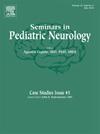The Genetic Landscape of Ischemic Stroke in Children - Current Knowledge and Future Perspectives
Abstract
Stroke in childhood has multiple etiologies, which are mostly distinct from those in adults. Genetic discoveries over the last decade pointed to monogenic disorders as a rare but significant cause of ischemic stroke in children and young adults, including small vessel and arterial ischemic stroke. These discoveries contributed to the understanding that stroke in children may be a sign of an underlying genetic disease. The identification of these diseases requires a detailed medical and family history collection, a careful clinical evaluation for the detection of systemic symptoms and signs, and neuroimaging assessment. Establishing an accurate etiological diagnosis and understanding the genetic risk factors for stroke are essential steps to decipher the underlying mechanisms, optimize the design of tailored prevention strategies, and facilitate the identification of novel therapeutic targets in some cases. Despite the increasing recognition of monogenic causes of stroke, genetic disorders remain understudied and therefore under-recognized in children with stroke. Increased awareness among healthcare providers is essential to facilitate accurate diagnosis in a timely manner. In this review, we provide a summary of the main single-gene disorders which may present as ischemic stroke in childhood and describe their clinical manifestations. We provide a set of practical suggestions for the diagnostic work up of these uncommon causes of stroke, based upon the stroke subtype and imaging characteristics that may suggest a monogenic diagnosis of ischemic stroke in children. Current hurdles in the genetic analyses of children with ischemic stroke as well as future prospectives are discussed.

 求助内容:
求助内容: 应助结果提醒方式:
应助结果提醒方式:


